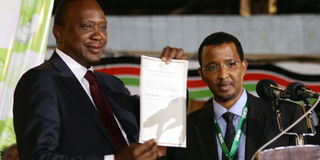Hassan defends election results

President Uhuru Kenyatta displays the presidential results certificate issued by Independent Electoral and Boundaries Commission (IEBC) chairman Issack Hassan March 9, 2013. The electoral commission has defended itself against claims of mismanaging the March 4 polls, saying the results were credible despite the technical difficulties. PHOTO/FILE
What you need to know:
- “The election results depended on how well political leaders were able to mobilise their voters. It was simple mathematics. Some of them did better than others and that had an impact on the outcome,” he told the meeting at the International Foundation for Electoral Systems on Wednesday night.
- Mr Hassan disagreed with an exit poll by two US political scientists showing that both Mr Kenyatta and Mr Odinga received 40 per cent of the vote.
The electoral commission has defended itself against claims of mismanaging the March 4 polls, saying the results were credible despite the technical difficulties.
“There was no theft of elections. There was no systematic plot to fail somebody. As a commission, we have taken the blame. We have been called thieves. But we understand all this comes with the territory of the commission.
“We hope that with passage of time, this anger will subside,” said Independent Electoral and Boundary Commission chairman Ahmed Issack Hassan.
Mr Hassan who was addressing a forum on elections in New York, said losers of the presidential race should blame themselves for failing to mobilise their supporters to register as voters.
“The election results depended on how well political leaders were able to mobilise their voters. It was simple mathematics. Some of them did better than others and that had an impact on the outcome,” he told the meeting at the International Foundation for Electoral Systems on Wednesday night.
Eight presidential candidates contested but it turned out to be a two-horse race between Cord leader Raila Odinga and Jubilee alliance’s Uhuru Kenyatta.
Mr Hassan declared Mr Kenyatta the winner after he garnered 6,173,433 votes against Mr Odinga’s 5,340,546.
Mr Odinga disputed the results and filed a petition at the Supreme Court whose judges however dismissed the case, stating that the said irregularities could not change the results.
Mr Hassan disagreed with an exit poll by two US political scientists showing that both Mr Kenyatta and Mr Odinga received 40 per cent of the vote.
“I don’t think the exit poll was correct. I don’t know what they were trying to prove,” he said and denied claims by Prof Joel Barkan, a US specialist in Kenyan politics, that the General Election cost $100 million (Sh8.5 billion).
Instead, Mr Hassan said the actual cost of the election was Sh6.8 billion.
The commission said it would use next month’s Makueni by-election to spruce up its tainted image.
“We have to build back our relationship. We have to discuss with the people and show them what really happened,” said Mr Hassan.
The July 22 by-election is due to the death of Senator Mutula Kilonzo in April.
Mr Hassan said they would use the mini-poll to prove that systems failed during the March 4 elections because of insufficient preparation and not rigging.




